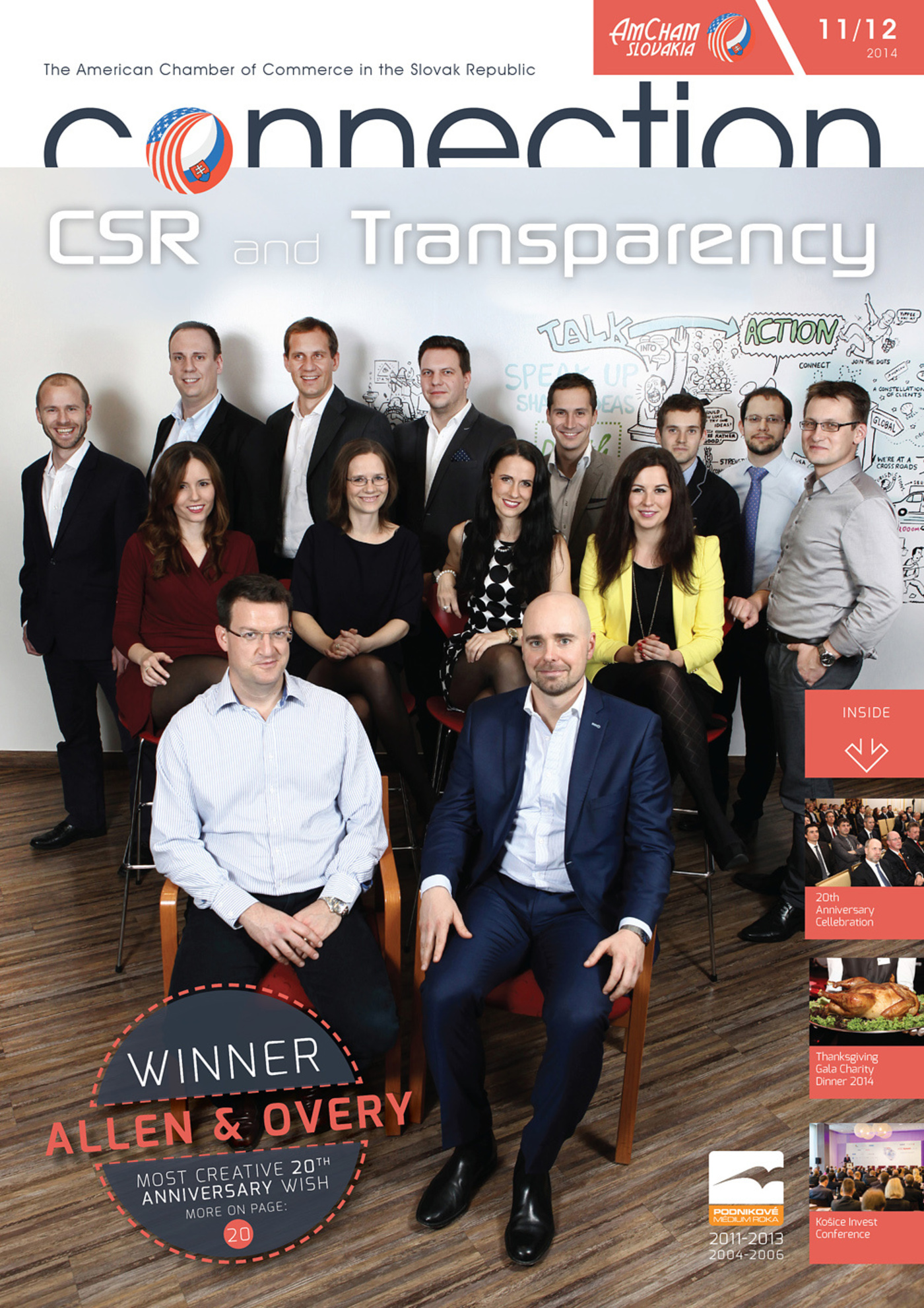What led the AmCham Board to dedicate the year 2014 to the Rule of Law initiative?
The business community associated in AmCham is concerned about Slovakia’s image as a country with legislative process that lacks transparency and predictability, a high level of corruption and its tolerance, as documented by various rankings; and the worsening state of the judiciary. All of these areas have a negative impact on Slovakia’s competitiveness and economy, and thereby also on people’s standard of living. As a result, AmCham’s Board of Directors felt a need to reach out to other relevant stakeholders and suggested creating a grand coalition of the key stakeholders for strengthening the rule of law in Slovakia.
Was the effort to create a broad coalition successful?
We managed to put together a group of thirteen like-minded organizations, including the main employers’ associations, the most active chambers of commerce present in Slovakia, as well as the main business associations. Combined, the actors which joined forces in the broad coalition represent an impressive 98% of Slovakia’s workforce.
What are the main issues that this initiative aims to address?
Our activities focus on three main areas: Transparency and Predictability of the Legal Process, Corruption as a Harmful Factor for “Brand Slovakia”, and Transparent and Efficient Judiciary as a Key Feature for Potential Investors.
Which aspects of the legislative process in Slovakia were identified as the most critical?
The current rules governing the legislative process in Slovakia are principally good; however, their pitfall is weak and improper implementation. A systematic consultation process which exists in most of the EU member states is not well established in the Slovak reality. This prevents representatives of the business sector from carrying out detailed, in-depth impact analyses of drafted bills and legislative measures. The current situation often results in frequent amendments to the adopted legislation, which has a negative impact on legal predictability and stability. Thus, we have focused on issues related to a systematic approach to communication with representatives of the business sector, impact assessment studies as well as the process of transposing European legislation and so-called indirect amendments to laws by amending proposals made by MPs.
What about corruption and its influence on how Slovakia is perceived abroad?
Slovakia’s long-term ranking among countries with high corruption perception levels has a substantial impact on costs of doing business. It also negatively affects “Brand Slovakia” and deters potential investors. We consider the level of redistributing state assets, mainly financial resources coming from EU funds and various grants, where corruption frequently occurs, as alarming. The absence of clear, precise and straightforward rules for investments permits corrupt behavior.
What other factors might discourage foreign investors from establishing their presence in Slovakia?
The image of Slovakia as a favored location for investors is also harmed by inefficient and slow court proceedings. AmCham surveys of the business environment conducted in 2010 and 2013 suggest that the vast majority of businesses in Slovakia have serious concerns about the straightforward, equitable and timely resolution of disputes by Slovak courts.
An effective and transparent judicial system is considered to be the foundation for a stable and foreseeable business environment by the business community. Legal disputes that keep dragging on for far too long in Slovakia have adverse effects on conducting proper business and in certain instances it may result in the liquidation of a company. A recent survey conducted by the European Commission shows that the time required for a ruling to be issued by the first instance court has grown longer in Slovakia. Civil and business disputes take more than 400 days at the first instance courts. Moreover, in 2010-2012 the number of resolved disputes decreased by 17% and the number of disputes in process has increased. Rulings by courts are unpredictable and frequently the rulings and crucial legal precedents change.
What has the initiative achieved during its first year and which goals lie ahead?
We have established three working groups, each focused on one of the previously mentioned key areas of our activities. The recommendations developed by these working groups established a basis for a comprehensive white paper which has been finalized. Our common goal is to present the White Paper to the Prime Minister and the government as well as the Parliament and discuss the recommendations with them early next year.
Igor Kottman, President of AmCham Slovakia



Follow us